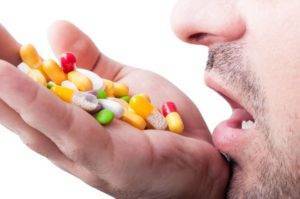
Today, prostatitis is one of the most common male diseases. This is not surprising. Not a single member of the stronger is free from his development. Pain, discomfort, potency and urination problems - this is a fraction of what threatens patients.
Is there a cure for prostatitis, a fast-acting cure? What are the effective drugs offered by the pharmaceutical industry for this disease? How to choose the best prostatitis medicine? Let’s try to address these issues. And let’s start with why prostatitis appears.
Causes of the disease
Prostatitis is a disease of the prostate gland that is associated with inflammation.
As a general rule, the causes of the disease are as follows:
- bacterial infections;
- allergic reactions;
- immune system failure, along with decreased immunity;
- prolonged cold, stressful situations, unhealthy diet;
- hormonal changes; circulatory disorders of the organ resulting from certain diseases, such as ischemic heart disease or atherosclerosis;
- prolonged sexual abstinence;
- Intentional prolongation of intercourse.
Medications for prostatitis
It is only natural that the most effective treatment for prostatitis in men is of concern to anyone who faces this disease. However, there is no definite answer to this. This is explained by the fact that the disease can be caused by many facts, so there is simply no single anti-prostatitis pill.
Treatment for prostatitis is usually divided into three directions, complementing each other, and includes:
- etiotropic therapy;
- pathogenetic therapy;
- symptomatic therapy.
Let’s examine these instructions in more detail and analyze the most effective ones for prostatitis.
Etiotropic therapy
Ethiotropic therapy makes it possible to eliminate the cause of the disease. The development of prostatitis is usually associated with bacteria, so in this case, antibiotics are used, which are prescribed by a doctor depending on the clinical picture.
Pathogenetic therapy
Pathogenetic therapy complements etiotropic treatment in cases where the latter's anti-prostatitis devices are clearly inadequate. In this case, it can be used for this purpose:
- alpha-blockers;
- bioregulatory peptides;
- plant products;
- means it improves blood circulation.
Symptomatic therapy
Symptomatic treatment makes it possible to eliminate the symptoms of the disease that cause discomfort to the patient. The vast majority of drugs in this group fall into the fast-acting category and are therefore mistaken for the best.
These types of medications are:
- nonsteroidal anti-inflammatory drugs (NSAIDs) with analgesic and antipyretic effects;
- hormonal preparations;
- antispasmodics;
- sedatives that have a relaxing, calming and slightly analgesic effect.
Attention!Medication should only be prescribed by a doctor. Self-medication is unacceptable in the treatment of prostatitis.
Microcrystals, drips and suppositories
In addition to tablets and injections, they are also prescribed for prostatitis:
- drips (pouring) - procedures that involve pouring a particular medicine into the opening of the urethra (the procedure is performed by a urologist and the volume of the poured medicine usually does not exceed 5 ml);
- microcycles;
- candles.
Traditional Medicine
In the vast majority of cases, traditional medicine is an excellent adjunct to medications prescribed by a urologist.
In this case, the following recipes are usually used:
- Recipe 1.Peel a pound of raw sunflower seeds, crush them, mix them with two hundred grams of honey, roll them into spheres and place in the fridge. To treat prostatitis, take one or two balls three times a day.
- Recipe 2.Pour forty grams of propolis with two hundred milliliters of rubbed alcohol. One tenth of a gram of the extract obtained is mixed with two grams of cocoa. The resulting mixture is formed into a candle which is then used rectally.
In addition, parsley root, dandelion, celandine, asparagus and black elderberry juice can be used to treat prostatitis.
Attention!You should consult your doctor before using folk remedies.
Although it is fairly easy to find a fast-acting drug for prostatitis (cheap drugs to treat painful symptoms in a patient), your doctor should prescribe treatment. Only he will be able to determine the stage of the disease and prescribe the most effective therapeutic regimen.
























